

Tongue-tie-booklet-version-3. What to Expect After Tongue Tie Release (Frenulotomy) - milk matters. After tongue tie treatment some babies resolve instantly and spontaneously, we hear about these cases online and it can be easy to think that if this doesn’t happen, it hasn’t “worked”. Suckling requires the use of lots of different muscles and tied babies have had to employ compensatory techniques to feed at the breast or bottle. Indeed Dr Ghaheri says: “An example I often cite was inspired by Dr. Brian Palmer: If I ask you to train for a marathon for 3 months, but during that 3 month period, your shoes are tied together, you will develop a specific way of running the marathon. You might be able to eventually finish that marathon on race day in that fashion. It’s often unrealistic to expect an instant result from frenulotomy, any more than you would if someone separated webbed fingers. What to Expect After Tongue Tie Release (Frenulotomy) - milk matters.
Tongue tie booklet. Tongue Tie - What Do Parents Need To Know? Sometimes breastfeeding mothers find themselves with breastfeeding problems (including sore or damaged nipples, recurrent plugged ducts, mastitis or thrush, vasospasm, low milk supply or over supply) or a baby who isn’t gaining well, has difficulty latching, makes clicking sounds, or chokes frequently, despite their best attempts to correct positioning and breastfeed frequently and effectively.
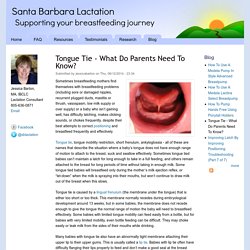
Tongue tie, tongue mobility restriction, short frenulum, ankyloglossia - all of these are names that describe the situation where a baby’s tongue does not have enough range of motion to attach to the breast, suck and swallow effectively. Analytical Armadillo - The Booby Whisperer: What Is Appropriate Aftercare Following Tongue Tie Treatment? PART 1. NOTE: Tongue ties can be treated in children for various reasons including dental or speech problems.
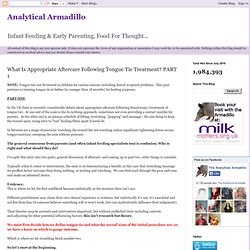
This post pertains to treating tongue tie in babies (ie younger than 18 months) for feeding purposes.PART ONE In the UK there is currently considerable debate about appropriate aftercare following frenulotomy (treatment of tongue tie). At one end of the scale is the do nothing approach, sometimes not even providing a contact number for parents. At the other end is an intense schedule of lifting, stretching, "popping" and massage - the aim being to keep the wound open, using force to "tear" healing fibres apart if needs be.
In between are a range of practices: watching the wound but not touching unless significant tightening down occurs; tongue exercises; sweeping the area without pressure. The general consensus from parents (and often infant feeding specialists too) is confusion. Evidence: This is where we hit the first roadblock because realistically at the moment there isn't any. and. Tongue Ties and Breastfeeding...just a "fad"? An interview with Dr. Bobby Ghaheri. Are tongue and lip ties just a new “passing fad” within the breastfeeding community or is it a real challenge that has a solution?

I asked women on my Facebook page, “What would you say to someone who states that tongue and lip ties are not a real thing that affects breastfeeding?” Here were some of their responses: (Within 12 hours I had over 300 responses from women who shared their experiences and the improvement they had once their child’s ties were snipped or lasered…) “We had to do BOTH the tongue and lip. My daughter was only two days old and was very jaundice. It worked. Catherine Watson Genna, IBCLC. Now that more mothers are breastfeeding, tongue-tie (ankyloglossia) is on the forefront of medical research again.
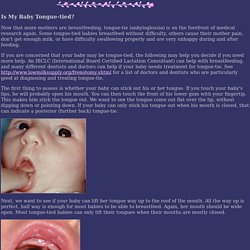
Some tongue-tied babies breastfeed without difficulty, others cause their mother pain, don't get enough milk, or have difficulty swallowing properly and are very unhappy during and after feeding. If you are concerned that your baby may be tongue-tied, the following may help you decide if you need more help. An IBCLC (International Board Certified Lactation Consultant) can help with breastfeeding, and many different dentists and doctors can help if your baby needs treatment for tongue-tie.
See for a list of doctors and dentists who are particularly good at diagnosing and treating tongue-tie. The first thing to assess is whether your baby can stick out his or her tongue. Next, we want to see if your baby can lift her tongue way up to the roof of the mouth. The hidden cause of feeding problems? (however you feed your baby) - milk mat... It’s not always obvious, the tongue can look ENTIRELY normal to the untrained eye… Sometimes it’s pulled into a heart shape or the attachment may be visible on the tip of the tongue?
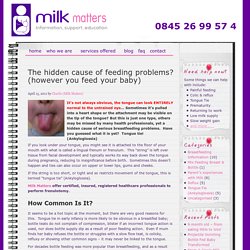
But this is just one type, others may be missed by many health professionals, yet a hidden cause of serious breastfeeding problems. Analytical Armadillo: Upper Lip Tie, Fall Guy... It is now common to hear "both lips should flange like a duck".
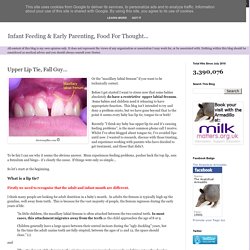
This actually isn't true, and as lactation consultants many have commented we often see this "duck positioning" when baby is shallow. Whilst Catherine often writes about tongue tie, I was interested to hear whether she felt lip ties were a significant cause of breastfeeding issues. She replied: "I think the upper lip frenulum is infrequently an issue when breastfeeding. I am concerned that the term "lip tie" causes parents to be overly concerned about this issue and could increase doctors' skepticism of frenotomy.
" Sucking blister on the top lip So we have a baby gripping hard with its lips, if the tongue is thrusting, rather than undulating (as we frequently see with a tongue tie), it can cause the baby to move back and forth like a piston. Add together tight grip of the lips + moving = friction blister on upper lip/babies slipping off the breast as their own suck pushes them backwards. Find a Tongue-tie Practitioner. The practitioners listed here are all members of the ATP and as such have provided evidence of appropriate training, professional registration and insurance.
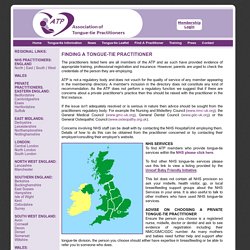
However, parents are urged to check the credentials of the person they are employing. ATP is not a regulatory body and does not vouch for the quality of service of any member appearing in the membership directory. A member's inclusion in the directory does not constitute any kind of recommendation.
As the ATP does not perform a regulatory function we suggest that if there are concerns about a private practitioner's practice then this should be raised with the practitioner in the first instance. If the issue isn't adequately resolved or is serious in nature then advice should be sought from the practitioners regulatory body. Concerns involving NHS staff can be dealt with by contacting the NHS Hospital/Unit employing them.
Tongue-tie Information and Infant Feeding Issues. What is a tongue-tie?
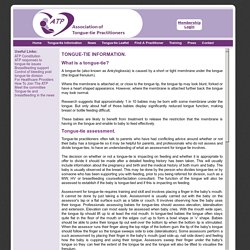
A tongue-tie (also known as Ankyloglossia) is caused by a short or tight membrane under the tongue (the lingual frenulum). Where the membrane is attached at, or close to the tongue tip, the tongue tip may look blunt, forked or have a heart shaped appearance. However, where the membrane is attached further back the tongue may look normal. Research suggests that approximately 1 in 10 babies may be born with some membrane under the tongue. But only about half of those babies display significantly reduced tongue function, making breast or bottle feeding difficult. These babies are likely to benefit from treatment to release the restriction that the membrane is having on the tongue and enable to baby to feed effectively. The Mild Tongue Tie. "Baby has a "mild" tongue tie but it's too small to cause any feeding problems.
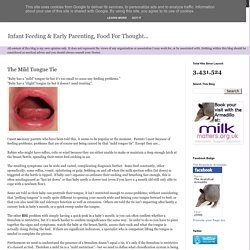
" "Baby has a "slight" tongue tie but it doesn't need treating". I meet so many parents who have been told this, it seems to be popular at the moment. Tongue tie. Tongue ties come in various severities.... - Bobby Ghaheri MD. How to Examine a Baby for Tongue-Tie or Lip-Tie — DrGhaheri.com. The only purpose of this post is to demonstrate how to examine a baby who may have a tongue-tie or lip-tie.
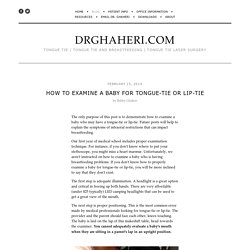
Future posts will help to explain the symptoms of intraoral restrictions that can impact breastfeeding. Our first year of medical school includes proper examination technique. For instance, if you don't know where to put your stethoscope, you might miss a heart murmur. Rethinking Tongue Tie Anatomy: Anterior vs Posterior Is Irrelevant — DrGhaher... Unfortunately, what I have encountered when most practitioners treat tongue tie is that the procedure is done incompletely. This post will describe how to completely treat a tongue tie to completely release any tension on the tongue.
After treating over a thousand babies with breastfeeding problems, it has become clear to me that our previous understanding of the anatomy of tongue tie is inaccurate. In my training, we only were taught to release the thin membrane of a tongue tie if restriction was noted (this was in the setting of speech problems, not breastfeeding). Most practitioners who haven't done a significant number of tongue tie procedures also tend to just snip this front membrane. Parents are impressed because of the lack of bleeding, and the practitioners willingly do it because it carries no risk.
The Myths About Painful Breastfeeding — DrGhaheri.com. Throughout this blog, I will do my best to try and address what is commonly said by doctors, dentists and lactation consultants who don't understand the correlation between tongue-tie and lip-tie and poor breastfeeding. I think that we must first disprove what they think they know. I think these myths are born out of a complete lack of education, and with time, hopefully we won't hear them as frequently. I've compiled a list of phrases that are often used when a mom is experiencing pain or other difficulties during breastfeeding.
I will try to show you why they are inaccurate and how knowing them before you talk to your doctor can be empowering.